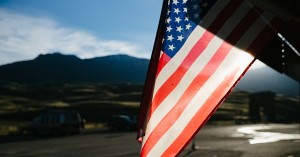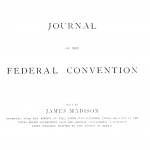 In the July 3 issue of the Philadelphia Inquirer, American University historian Daniel Dreisbach said the Constitution’s political vision was in part formed by the Bible. Dreisbach wrote that “The Constitution gives evidence of a political vision informed, in part, by the Bible, and it includes features that were familiar to a Bible-reading people.” He added that “the founders’ devotion to the separation of powers and checks and balances reflected a biblical understanding of original sin and a reluctance to vest unchecked government power in the hands of fallen human beings.”
In the July 3 issue of the Philadelphia Inquirer, American University historian Daniel Dreisbach said the Constitution’s political vision was in part formed by the Bible. Dreisbach wrote that “The Constitution gives evidence of a political vision informed, in part, by the Bible, and it includes features that were familiar to a Bible-reading people.” He added that “the founders’ devotion to the separation of powers and checks and balances reflected a biblical understanding of original sin and a reluctance to vest unchecked government power in the hands of fallen human beings.”
If the delegates to the Constitutional Convention had Bible doctrine in mind when they framed the Constitution, they had a strange way of showing it. I am in the middle of a summer long project to read James Madison’s daily notes on the debates during the Convention and I am not finding evidence of the Bible’s influence. The Convention got underway in earnest in late May of 1787 and proceeded six days a week until mid-September. Thus far, the delegates rejected a direct call to prayer made by Benjamin Franklin and rarely referred to religion in their remarks.
When Ben Franklin implored the delegates to seek the assistance of heaven, the delegates adjourned without voting on Franklin’s motion. Franklin later invoked the Scripture in a debate over qualifications for the presidency. In his Inquirer article, Dreisbach said “the delegates occasionally invoked the Bible in surprising and interesting ways.” Based on my reading, I think it would be more accurate to say the delegates rarely invoked the Bible.
Franklin’s reference to the Bible was supplemented by another persuasive appeal. Franklin’s comments were in response to a motion by Charles Pinkney to require “that the President of the U. S. the Judges, and members of the Legislature should be required to swear that they were respectively possessed of a cleared unincumbered Estate to the amount of —– in the case of the President &c &c.” Pinkney wanted to limit these offices to land owners with an undetermined level of wealth. First, Connecticut’s Oliver Ellsworth spoke against the motion followed by Franklin.
Mr. ELSEWORTH [Oliver Ellsworth]. The different circumstances of different parts of the U. S. and the probable difference between the present and future circumstances of the whole, render it improper to have either uniform or fixed qualifications. Make them so high as to be useful in the S. States, and they will be inapplicable to the E. States. Suit them to the latter, and they will serve no purpose in the former. In like manner what may be accomodated to the existing State of things among us, may be very inconvenient in some future state of them. He thought for these reasons that it was better to leave this matter to the Legislative discretion than to attempt a provision for it in the Constitution.
Doctr. FRANKLIN expressed his dislike of every thing that tended to debase the spirit of the common people. If honesty was often the companion of wealth, and if poverty was exposed to peculiar temptation, it was not less true that the possession of property increased the desire of more property. Some of the greatest rogues he was ever acquainted with, were the richest rogues. We should remember the character which the Scripture requires in Rulers, that they should be men hating covetousness. This Constitution will be much read and attended to in Europe, and if it should betray a great partiality to the rich, will not only hurt us in the esteem of the most liberal and enlightened men there, but discourage the common people from removing into this Country.
Franklin’s use of Scripture was one aspect of his argument but he wanted to discourage a perception of partiality to the rich for other reasons. Specifically, Franklin thought Pinkney’s proposal would lower the reputation of the new nation among the enlightened as well as discourage immigration of common folk.
As I read the debates, religious references were used sparingly and as supplements to historical and political arguments. The delegates frequently refer to Greece and Rome, European governments, and Britain. Sometimes they explicitly refer to Montesquieu, whereas they frequently invoke his The Spirit of Laws without mentioning a direct source.
Having addressed Dreisbach’s overreach, I want to add that he is surely correct that the Christianity of the founders was one part of the mix of influences. For instance, Dreisbach is on more solid ground when he writes:
The founding generation drew on and synthesized diverse intellectual traditions in forming their political thought. Among them were British constitutionalism, Enlightenment liberalism, and classical and civic republicanism.
To this list of intellectual influences, one must add the Bible…
On the whole, however, I think Dreisbach skews his evidence to create an incomplete and ultimately inaccurate narrative. He says the Bible was the most frequently cited source over Locke and Montesquieu but doesn’t mention that a large number of these citations were in sermons from pastors and not by the founders. He doesn’t balance his presentation by noting that the federalists did not mention the Bible in their defense of the Constitution (the anti-federalists did reference the Bible, but they didn’t prevail). Dreisbach notes that the 1774 Continental Congress opened with prayer and Bible reading but failed to disclose that Ben Franklin’s call for the Constitutional Convention to do the same thing was rejected by a sizable majority of delegates. Then, as explained above, Dreisbach invoked Franklin’s reference to Scripture in isolation without including the context of his other remarks and the rarity of their occurrence. Finally, during the Constitutional Convention, when separation of powers was brought up, the source of influence was more often Montesquieu than theology.
Some may object to my critique of a distinguished American historian. However, I say read the debates of the Constitutional Convention before you dismiss my response. On the whole, I can’t find sufficient evidence that the Constitution’s political vision had much to do with the Bible. I realize that religion was very important at various points in the American experience and many of the founders expressed thanks to God. Some of the founders wanted the new republic to privilege religion and particularly Christianity. To me, the real miracle is that the consensus of the framers was to eliminate religious tests and to include language in the First Amendment enshrining freedom of conscience for all, even those who hold no religion.
